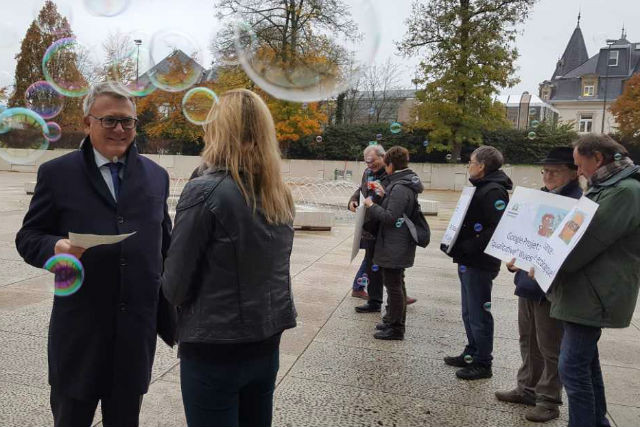Five ministers, around 400 audience members and 12 students participated in the eagerly awaited transition talks hosted at the Grand Théâtre.
Between economy minister Etienne Schneider’s oft repeated spiel on Rifkin’s Third Industrial Revolution (TIR), aimed at slowing growth while increasing productivity and living more sustainably, it was the critics that stood out strongest.
The first voice of dissent was heard at the theatre entrance where Luxembourg’s ecological movement quietly picketed the event with banners and soap bubbles. “The Rifkin process is not a substitute for a real future and growth debate!” was the key message, but one could argue that the voices inside the main theatre were not wholly in consensus. Something resembling a real debate was underway even if, as one student speaker put it, there was a lack of diversity in the besuited audience members.
Among the speakers were a group of students from different colleges who were invited to pitch their own ideas for implementing the TIR and getting more people behind it.
Rifkin games in schools
Compulsory Rifkin games in school, applications which measure money and energy used and saved, by opting for different modes of transport, construction of syndicated housing, banning RGTR buses from the capital and introducing a universal basic income were among the suggestions. They were mostly received with the same answer by the five ministers that they were already doing these things or something similar on a smaller scale.
Earlier in the morning, Schneider had referred several times to criticisms to the Rifkin process which began four years ago, mainly in relation to the consultancy fee of hiring the American economist. If he thought that was in the past, he was soon set straight, as during the last 45 minutes, a handful of business and industry representatives were invited onstage to raise their concerns.

Photo: Maison Moderne. Economy Minister Etienne Schneider speaks to two other people onstage before Thursday's discussion
“We have a lot of know-how but not a lot of know-why, I think that’s what’s lacking in this whole discussion,” Marco Thomé, president of Luxembourg’s chamber of civil servants said, adding: “Without a philosophical conversation we’re not going to solve this. How do we integrate people in this?”
Artisans' chamber president Tom Oberweis, meanwhile, raised concerns that smaller tradespeople, who will certainly be involved in implementing TIR changes, such as through circular economy construction, renovation and the internet of things, lack the skills. “Are they going to be left behind? We’ve got to work together to train our people in these skills,” he said.
Concrete projects
Minister Schneider listed some of the concrete projects that emerged from the initial report published in 2016. Among them was the creation of a database of circular economy construction materials and energy efficient methods, which will entitle those who use them, to special construction certificates. Circular economy housing projects are underway in Wiltz.
A push to install larger numbers of photo voltaic panels and solar power plants by the economy ministry will soon be launched. Schneider explained that companies will be invited to tender for these plants if they can guarantee power generation for 15 years.
He talked about the creation of a national industry 4.0 platform to support companies through the transition to the TIR by, for example, installing two additional supercomputers in Luxembourg. The University of Luxembourg, meanwhile, has launched two studies to better plan mobility in Luxembourg. Schneider stressed that the process was ongoing.
